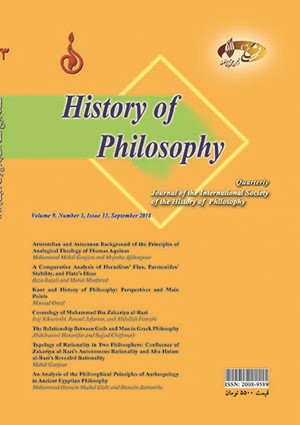-
-
List of Articles
-
Open Access Article
1 - A Comparative Analysis of Heraclitus’ Flux, Parmenides’ Stability, and Plato’s Ideas
Reza Bazeli Mahdi Monfared -
Open Access Article
2 - Typology of Rationality in Two Philosophers: Confluence of Zakariya (al-Razi’s Autonomous Rationality and Abu Hatam al-Razi’s Revealed Rationality)
Mahdi Ganjvar -
Open Access Article
3 - An Analysis of the Philosophical Principles of Anthropology in Ancient Egyptian Philosophy
Mohammad Hossein Madad Elahee Hossein Zamaniha -
Open Access Article
4 - Foreword
Hossein Kalbasi Ashtari -
Open Access Article
5 - Aristotelian and Avicennan Background of the Principles of Analogical Theology of Thomas Aquinas
Mohammad Mahdi Gorjian Mojtaba Afsharpour -
Open Access Article
6 - Kant and History of Philosophy: Perspectives and Main Points
Masoud Omid -
Open Access Article
7 - Cosmology of Muhammad Ibn Zakariya al-Razi
Iraj Nikseresht Rasool Jafarian Abdullah Farrahi -
Open Access Article
8 - The Relationship between Gods and Man in Greek Philosophy
Abdulrasul Hasanifar Sajjad Chitforush
-
The rights to this website are owned by the Raimag Press Management System.
Copyright © 2017-2026







